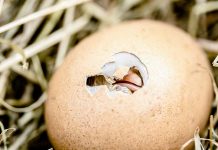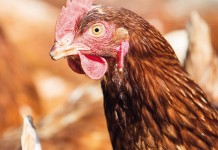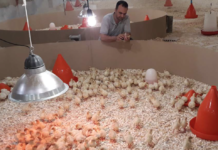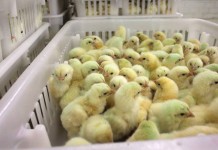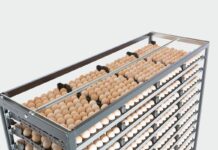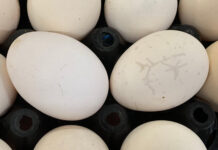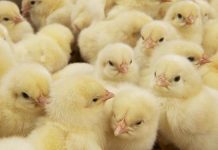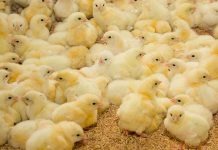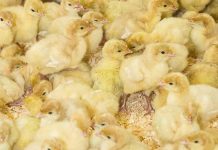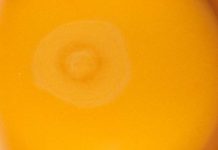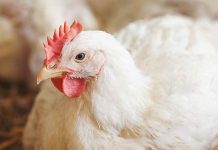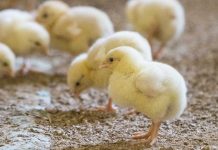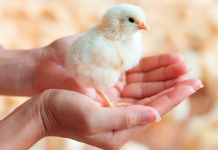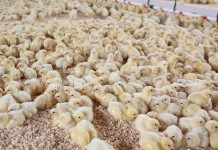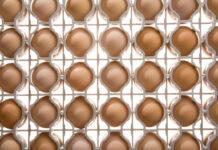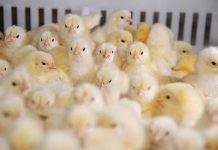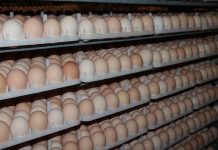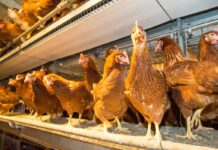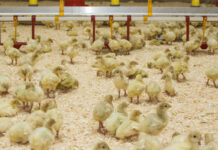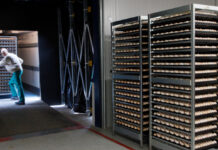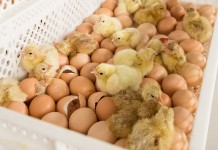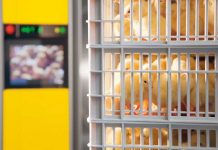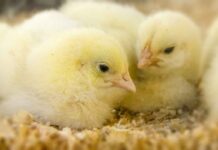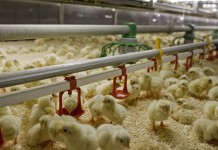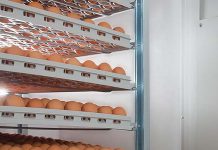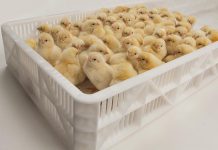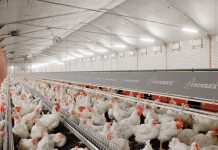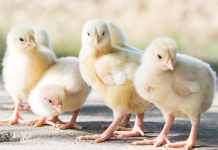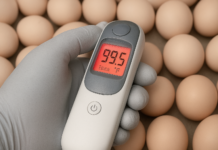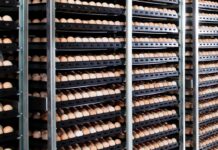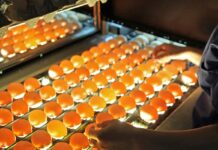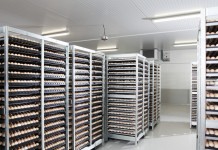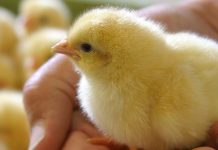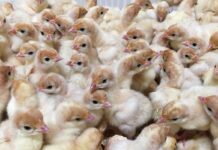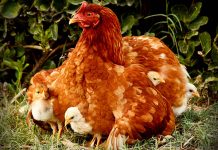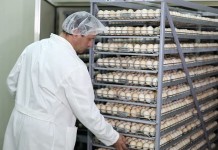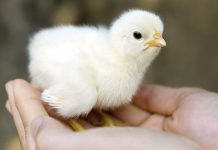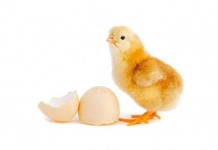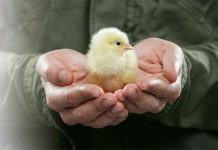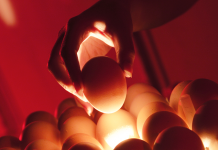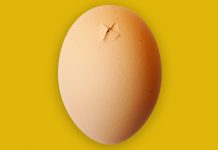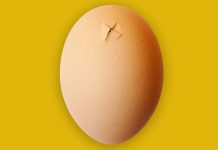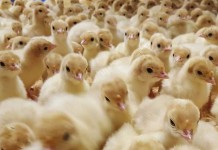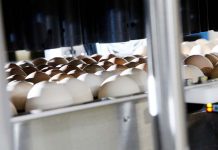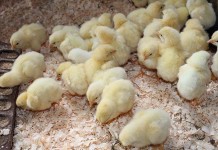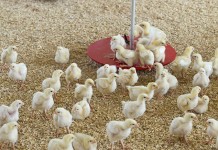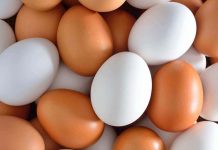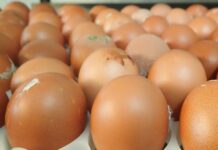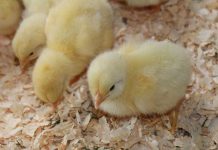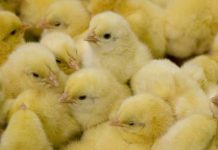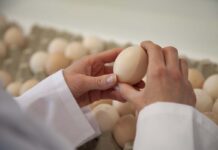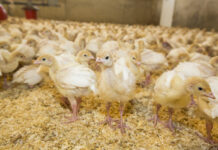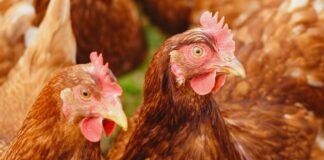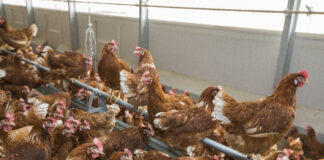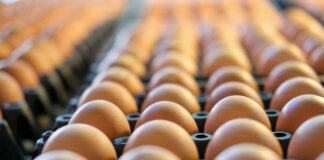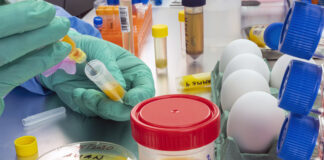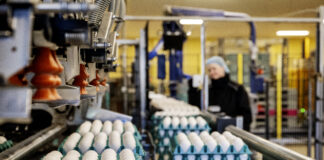What happens during transfer?
Why chicks can’t set and hatch in the same incubator and need transfer.
At the point chicks hatch, they create a lot of fluff and...
Automatic laying nests require good management
Martin Barten, senior hatchery specialist form Pas Reform Hatchery Technologies, tells his experience about a good management of the automatic laying nests.
“Pas Reform’s involvement...
Hatching for egg quality
Hatching for egg quality implies caring of various factors. The age of the flock, number of storage days and incubation program are typically included...
Some common issues of the first week in brooding turkey poults
Turkey poults are very sensitive to environmental conditions and any uncomfortable situation very quickly leads to a problem and even sometimes a disaster. Any...
Determining the correct temperature for transporting 18-day incubated eggs
On-farm hatching is now fairly common in some countries, it requires incubated eggs to be transported from the hatchery to the farm at 18–18.5...
Hatching eggs: the importance of assessing internal egg quality
Hatching egg quality has a significant impact on hatchability and chick quality. By making egg quality control a part of the routine procedures in...
Evaluating the exterior quality of hatching eggs
Quality of eggs has a significant impact on hatchability and chick quality. Since a hatchery manager’s main aim is to produce the highest possible...
Incubation and the role of Carbon Dioxide (CO2) in embryo development
The practice, or “art”, of artificially incubation of the avian egg dates back some 3,000 years to the ancient Egyptian mud/brick oven type rooms...
Metabolic differences in the blood of chick embryos
A study was conducted in order to investigate metabolic differences in the blood of chick embryos and post-hatch chicks from two egg sizes and...
Air pressure in the hatchery
The hatchery is where we create the optimum conditions for life to develop. Although we are talking about the development of embryos, there are...
Fertile or not?
Fertilisation and a fertile egg marks the beginning of a new life but is by no means a guarantee of a long life, as...
5 easy steps to check fumigation efficacy
Fumigation is common practice for hatching eggs to prevent losses due to microbial contamination. You should check your fumigation annually to make sure it...
Egg incubation influences leg health in broilers
Up to 30% of late growth meat broilers demonstrate reduced levels of locomotion, which is cause for concern for both the industry and chicken...
Getting to the bottom of sex-related first week mortality in the hatchery
"Why are so many chicks dying in their first week in the hatchery?" I could hear the worry in his voice when I received...
Better hatch and post-hatch performance
Hatchability, chick quality and post-hatch performance improve substantially when embryo-response parameters are actively controlled during incubation. The BioStreamerTM concept, developed by Petersime, continually monitors...
Hatcheries data collection and analysis
Hatcheries collect large quantities of data to monitor performance and to make sure equipment are operating within set operating limits.
These data are a valuable...
Keeping the hatchery clean and disinfected
The main goal of any hatchery is to produce a maximum number of healthy, uniform day-old chicks, poults or ducklings. Poor hatchery hygiene will...
Jamesway’s Webinar talking about the Hatcher
The hatcher is often the forgotten sister of the incubator. Most presentations focus on getting everything right in the incubator, assuming that if the incubation...
Importance of hatch-time and access to feed on broiler muscle development
In commercial settings, hatching occurs over a 24-48 h window and chicks are held in the incubator until a majority have cleared the shell.
Earlier...
Managing eggs and chicks from young breeders
First week mortality is often higher in chicks from very young breeders (25-30 weeks) than in chicks from older breeders. What causes these chicks...
The importance of right incubation temperatures
In this study researchers investigate the importante of right incubation temperature on broiler performance. Up to 30% of late growth meat chickens demonstrate reduced...
Egg weight loss during incubation of poults and chicks
Why is it important and how do we measure it?
Technology and the associated hatchery and equipment continues to advance incubation to levels previously unavailable,...
Perch usage in laying hens
Modern poultry farming is seeing a significant shift towards higher welfare standards. This is due to the demand of the public for welfare-friendly products...
Flip-overs: causes and solutions in brooding
The poult start is an extension of the hatching process. The whole process, including poult placement, is only as strong as its weakest link.
William...
Avicola Yugoslavia broiler hatchery is first in Peru to adopt SmartPro™
Avicola Yugoslavia, based in Trujillo, Peru, is the first broiler hatchery in Peru to work with SmartPro™ incubation solutions from Royal Pas Reform –...
Why the difference?
Eggs from the same source delivered to different hatcheries will often give different results, even though their biological quality was identical and they were...
Different incubation profiles for different breeds?
Breeding has powerful effects. Although all chicken breeds originate from the same wild ancestor, they differ dramatically in appearance, physiology, type and metabolic rate....
Chick quality monitoring and diagnostics
Evaluation of chick quality in the hatchery and mortality in the field can be used to identify general problem areas: the incubator, the hatcher, or the environment after hatch.
Energy-efficiency in pre-conditioning inlet air for setters and hatchers
Hatcheries are found in a variety of climates, from the hot, humid tropics of South East Asia to hot, arid zones in the Middle...
Healthy, uniform day-old chicks require hatchery accurate climate data
In a modern hatchery, climate data are collected from various sensors installed in incubators and hatchery rooms, and from handheld measuring instruments. The performance...
Checking and calibrating sensors: essential preventive hatchery maintenance
We expect incubators to function 24/7 without disruption - and with the highest levels of accuracy from the sensors in particular, on whose outputs...
The effect of hot and cold hatcher temperature profiles on hatchability and chick quality
An eggshell temperature of 100°F (37.8°C) is widely accepted as optimal for embryonic development from the start of incubation up until transfer time. Eggshell...
How to reduce antibiotics in broiler production?
There is an increased awareness recently in relation to the sensible use of antibiotics within poultry and livestock production. When looking at broiler production,...
Ventilation in the setter – Which is the dominant element for ventilation control: CO2...
Single-stage versus multi-stage
During the past decades, single-stage incubation has gained popularity and eventually replaced multi-stage incubation as the dominant incubation method. This is not...
Short-term temperature training in the hatcher improves stress response in broiler chickens?
An alternative approach to improve functional traits alongside with the production efficiency of fast growing broiler chickens provides temperature training in the hatcher (PTT:...
To feed or not to feed? That is the question. Is the early feeding...
Development of the avian embryo, or chick, can be categorized into one of two strategies designed to meet very different physiological and biological needs....
Egg deposition of maternal testosterone is controlled by the pre-ovulatory peak of luteinizing hormone
Variability of androgen concentrations in the avian egg is often explained by an adaptive hypothesis according to which differential maternal deposition of yolk hormones...
Does the external climate matter?
The optimum climate parameters for embryo development – temperature, humidity, and the balance between oxygen supply and carbon dioxide release from the incubator –...
What is good chick quality?
When asking the question “What is good chick quality?”, the responses can be very different based on the person and their role. For instance,...
Modern incubation techniques to improve chick quality and uniformity. The importance of chick quality...
The poultry industry has advanced rapidly over the past decades with hatchery management playing an important role in ensuring the successful production of good-quality...
How can hatcheries lessen the impact of Covid-19?
The world is currently experiencing a pandemic caused by a coronavirus, Covid-19. While the virus probably originated in animals, it appears that it only...
How to assess chick quality
The term "chick quality" is rather vague, as it can refer to various aspects – from directly visible physical traits to hidden ones, such...
Early embryonic mortality
At the moment an egg is laid, the embryo already consists of 30-60,000 cells. The death of some of them – for example under...
Physiological zero in hatchery management
On the farm, the eggs cool down after laying and are either transported on the same day or stored for a few days before...
Evaluation of effects of in ovo light stimulation on incubation performance and chick quality...
In sustainable commercial poultry business, hatchability and chick quality are key points that determine the yield and cost of production. Positive results of lighted...
Navel practicalities
A well-closed navel is one of the most important and easily visible signs of chick quality. In a good quality chick, the navel is...
The specific requirements and sensitivities of turkey egg incubation
Turkey eggs have a high incubation success rate when all the species-specific areas of incubation are managed correctly. Hence, a suite of incubation equipment...
SPIDES, short periods of incubation during egg storage
Why SPIDES is so important in incubation? If hatching eggs are stored for more than a week before being set in an incubator their...
Rethink the golden rules of incubation
Your incubation results might be affected by a lack of accuracy in the rules you’re applying. The rules of incubation have been derived from...
Limiting embryonic overheating during incubation
Embryonic overheating can represent an issue for incubators. For many things in life, a change in temperature of +0.5°C is hardly noticeable. However, for...
Pas Reform launches SmartCare™
As a future-focused business that serves the hatchery sector worldwide, Pas Reform has built its reputation as an innovator in single stage incubation technologies....
When the hatchery power supply fails
In a contemporary hatchery all the parameters influencing incubation – such as temperature, humidity, ventilation and the turning of eggs – are based on...
Cleanliness of hatching eggs: biosecurity and hatchery management implications
We are hosting an article originally published on the More About Chicken website, a platform mainly aimed at consumers that also addresses topics relevant...
Testing the fertility is important to predict hatching success
Measuring the level of fertility of any batch of eggs is a key factor in hatcheries. Fertility testing may be necessary in order to...
Gaining a better understanding of incubation in a hatchery
The contemporary hatchery is a complex installation. The core part is the incubators, supported by the devices that facilitate their function and auxiliary machines...
Hatchery waste management
There are various options for hatchery managers to convert their waste into value-added products such as compost, fertilizer, liming agents for soil amendment, biogas, medical products, and animal feed. This article explores some of these options.
Timing is everything in early feeding
Early feeding is now a critical point. When using nature as a reference to what are the optimum requirements of the day-old chick, we...
Prevention of cross-contamination in the hatchery
How to properly prevent cross-contamination in the hatchery. Here some easy steps to achieve a better biosecurity in your hatchery.
The impact of raised incubation temperature on hatch, chick quality and broiler performance
Two experiments were conducted at the Aviagen product development center in the USA to study the effect of increased eggshell temperature during mid to late incubation on hatchability and chick quality
Air cell up when setting eggs!
It is important to pay attention to the orientation of the eggs when placing them on setter trays as this has quite an impact...
Air cell up when setting eggs!
It is important to pay attention to the orientation of the eggs when placing them on setter trays as this has quite an impact...
Turkey hatcheries – The past 25 years and the future of single-stage
A quick time travel back to a turkey hatchery in 1992 might show you a frazzled hatchery manager frantically trying to get eggs trayed,...
In-ovo vaccination requires good hatchery management
In-ovo vaccination is gaining popularity and is being used in an increasing number of hatcheries. A driving force behind this is the increasing number...
Incubation temperatures influence muscle growth and energy in broiler embryos
In ovo embryogenesis in broiler can be modulated by alteration of external factors, like the incubation temperatures, as shown in several publications.
Embryonic myogenesis in...
Review of different day-old chick quality parameters in layer type breeds – Part 2
The aim of every commercial layer hatchery is a maximum hatchability of first quality chicks. The evaluation of chick quality in the hatchery provides...
Measuring egg shell quality
Maintaining egg shell quality is important for maximizing production of broiler chicks from breeders as shell quality and hatchability go hand in hand. Thin...
Separating welfare facts from fiction
It has become a confusing market for customers to decipher which technologies offer the best welfare-friendly solutions for their animals. How do you separate...
Effective fumigation of hatching eggs to improve hatch results
Microbial contamination of hatching eggs is a main concern of hatcheries as it causes decreased hatchability, poor chick quality, growth and performance. It is...
The fertilization process and embryo mortality during incubation. What is the Relationship?
The goal of a successful incubation operation is to produce the maximum number of quality chicks from the fewest breeders housed in order to...
Is chick yield still a valid reference?
Many hatcheries still use chick yield – chick yield is the average chick weight divided by the average fresh egg weight multiplied by 100...
Variation in individual egg weight loss
A chicken egg has to lose around 11-13% of its original weight during the first 18 days of incubation. This weight loss is needed...
Monitoring the turkey incubation process to ensure the best results
Incubating turkey eggs is often considered to be more challenging than incubating broiler eggs, yet, in essence, the basic principle of success is the...


